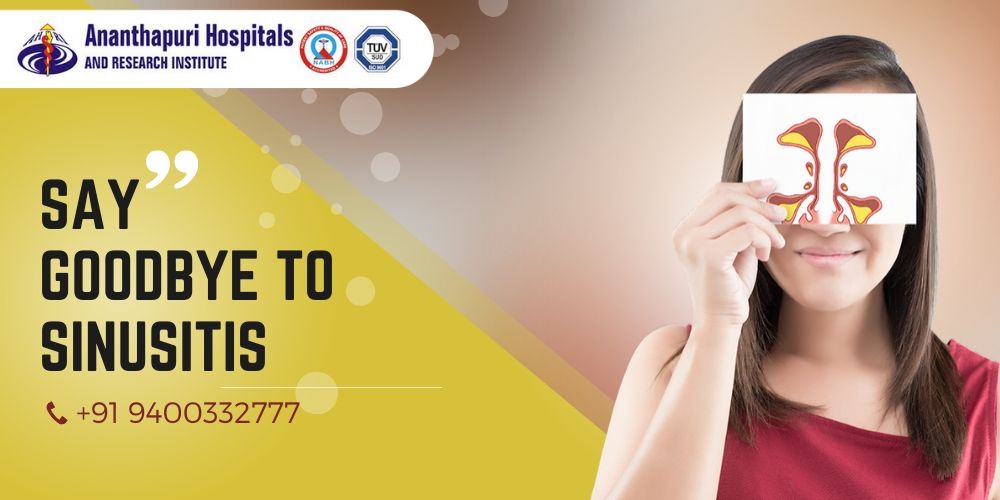- 16/December/2019

Sinusitis - Types - Symptoms - Ananthapuri Hospitals, Trivandrum
“Aaachoooooooooo…!! AAAA….aaaaa….aaaaachoooooooooooooo”
Sinusitis troubling you a bit too much? Read the article to learn about the various treatments and home remedies for sinusitis.
What Is Sinusitis?
Sinuses are air-filled cavities that are present in the forehead, cheek, and area surrounding the eyes.
Mucus is a slippery, fluid-like substance produced by many lining tissues in your body.
Sometimes, if your mucous membrane gets infected, they excrete more mucus than normal. This leads to filling of sinuses with mucus.
This trapped mucus causes viruses, bacteria, or fungi to grow easily in your sinuses. Eventually, this results in a sinus infection, which is also called ‘Sinusitis’.
What Are The Different Types Of Sinusitis?
Here is a quick brief on the types of sinusitis before we move on to their treatments.
- Acute sinusitis - is a short-term inflammation of the membranes that line your nose and surrounding sinuses
- Chronic Sinusitis - is a long term inflammation of the tissues inside your sinuses surrounding your nose
- Acute Frontal Sinusitis - is the inflammation of sinuses located just above your eyes in the brow region
- Ethmoid Sinusitis - is the inflammation of sinuses located near the bridge of your nose
- Sphenoidal Sinusitis- is the inflammation of sinuses located behind the eyes
- Maxillary Sinusitis - is the inflammation of sinuses located below the eye.
What Are The Symptoms Of Sinusitis?
The following are the common symptoms of sinusitis.
- Sinus pressure or pain around your eyes and cheeks
- Sneezing and coughing
- A runny and stuffy nose that lasts more than a week
- Severe headache
- Fever
- Bad breath
- Thick yellow or green mucus formation
- Fatigue
- Decreased sense of smell
Can You Treat Sinusitis At Home?
The best option is to visit a doctor and seek medical attention. However, in most sinusitis cases, these home remedies can give you great relief from its symptoms:
- Drink plenty of water to stay hydrated and help thin mucus
- Include garlic, ginger and onion in your meal to boost your immunity
- Use a humidifier to help relieve nasal blockages
- Use a vapouriser or take steam from a bowl of hot water to clear nasal passages
- Use Eucalyptus oil to open up the sinuses and get rid of mucus
- Hold a moist, warm washcloth over your sinuses to ease facial pain
- Use Over The Counter (OTC) oral decongestant therapy to help dry up the mucus
- Take some good rest to help your body recover from the infection
- Use saline nasal sprays to clear your nasal passages
- Sleep with your head elevated to help your sinuses drain
Should You Visit A Doctor For Sinusitis?
Yes. As we said before, seeking medical attention is the best choice. If left untreated, sinusitis can lead to orbital, intracranial complications like meningitis, a collection of pus in the brain, or an infection of the bone.
Your doctor may prescribe the following after thorough examination.
- Antibiotics - they are widely used to treat bacterial sinus infections. Antibiotics are usually prescribed for 5 to 10 days.
- Nasal decongestant sprays - they can help shrink swollen nasal passages and clear your nasal passage. It should be used for not more than 5 days.
- Antihistamines - they help fight the symptoms of allergies that cause swelling of nasal tissues. Over usage can cause excessive drying and slow draining of the sinuses
- Nasal saline washes - they help clear mucus from nasal passages. Use as prescribed by the doctor.
- Surgery - Indicated for chronic sinusitis not responding to medical treatment or with sinonasal polyps.
Consult an ENT specialist if you find it difficult to carry out your daily activities.
Ananthapuri Hospitals has the best team of surgeons and ENT specialists at your service. To book an appointment, call us at +91 9400332777 or visit our hospital at Chacka, NH Bypass, Thiruvananthapuram.

